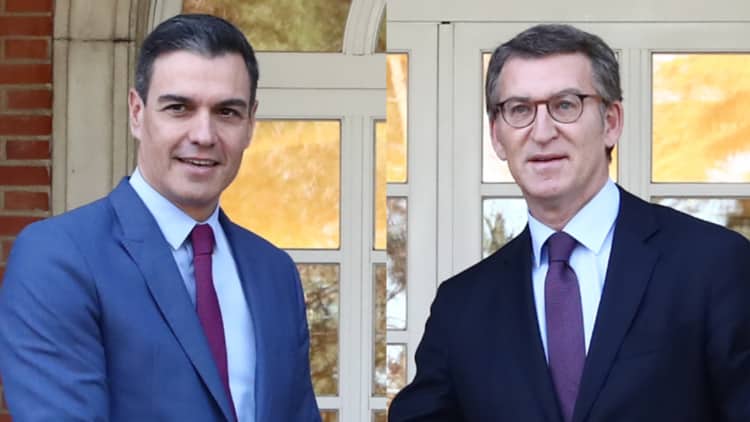Ángel Collado
With four days to go before the end of the election campaign on 23 July, the president of the PP, Alberto Núñez Feijóo, is presenting himself as a sure winner and is asking for votes so as not to depend on anyone to form a government.
The head of the Executive, Pedro Sánchez, insists on promising the PSOE a comeback that the polls deny him and even announce the opposite phenomenon: more wear and tear with more personal presence in the media and the failure of his appeal to the vote of fear to stop change.
The development of the campaign has changed the expectations and objectives of the parties after Sánchez’s fiasco in the debate with Feijóo on television on the 10th, but above all because of the trends indicated by all the polls except the CIS, which already failed miserably in the elections of 28 May.
The governmental centre’s study is the only one that now draws the carambola desired by the president of the Government to remain in power as before, with the same populist partners of the extreme left and the support of the pro-independence parties. Private companies working for media outlets of all stripes, including those most sympathetic to Sánchez, predict the opposite: the right is assured of an absolute majority or is just one seat away from achieving it.
Beyond the question of whether the PP and Vox will win between 175 and 182 seats in a Congress of 350 deputies, which is the average range of the polls, the added drama for the head of the Executive is the general trend experienced in the campaign. The PP continues to rise at the expense of the extreme right, Vox, in the face of a left-wing bloc that is dwindling in general and in particular because neither the PSOE nor Sumar have stopped subtracting seats from their starting positions.
According to the polls, none of the PSOE’s big bets to achieve the “comeback” announced by Sánchez, which should have begun last week in the debate with Feijóo, are working. Neither the personal image of the president of the Government talking about himself all the time in all media and formats, nor the call to stop the right-wing have changed the electoral trends reflected in the socialist defeat in the May elections and confirmed in the polls of June and July.
These data have led to the undisguised pessimism of the PSOE’s campaign, based on defensive messages, the search for the vote of fear sown on the left, and the euphoria of the PP. “We may not be your party, but we are the solution” is the slogan now coined by the PP that best sums up its ambition in claiming the support of socialist and Vox voters at the same time.
Faced with a Sánchez in a tone of farewell and personal vindication, Feijóo has surpassed his initial goal of reaching 150 seats to dream of exceeding 160. He presents as an objective within his reach a comfortable majority that would allow him to dispense with Vox in a future cabinet and limit himself to signing abstentions or programmatic pacts with Santiago Abascal that would give stability to a PP Executive on its own.
If Sánchez’s social-communist coalition government and Vox have fed off each other with their extremism throughout the legislature, Feijóo is now trying to take advantage of the fact that neither of them are running their respective campaigns.
The Popular Party’s ballot is as much about preventing the extreme right from coming to power as it is about putting an end to Sanchismo, the mainstays of the PSOE and Abascal’s campaign.
This is the message that the PP president is cultivating in order to aspire to a broad majority, which he can only achieve if he recovers former voters of his party who in recent years have gone over to Abascal’s ‘authentic right’ option.







